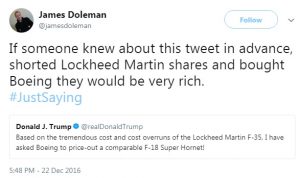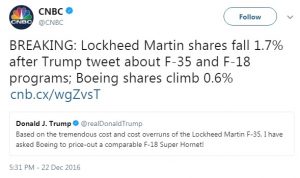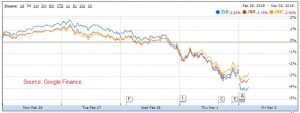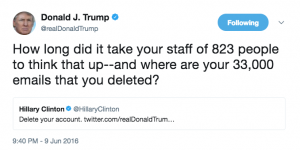In this post, I suggested there was an important parallel between the structure of the Internet Research Agency indictment rolled out Friday and the Paul Manafort and Rick Gates indictment.
Both use a conspiracy to defraud the US (of its ability to enforce campaign finance and transparency law) as their backbone.
Just as way of comparison, Charge 1 in the IRA indictment alleges conspiracy to defraud the US because defendants impaired the lawful functions of the FEC, DOJ, and State in administering disclosure about foreign involvement in US politics.
From in or around 2014 to the present, in the District of Columbia and elsewhere, Defendants, together with others known and unknown to the Grand Jury, knowingly and intentionally conspired to defraud the United States by impairing, obstructing, and defeating the lawful functions of the Federal Election Commission, the U.S. Department of Justice, and the U.S. Department of State in administering federal requirements for disclosure of foreign involvement in certain domestic activities.
Charge 1 in the Manafort indictment alleges conspiracy to defraud the US because the defendants impaired the lawful functions of DOJ and Treasury to require disclosures about foreign political activity in US politics.
From in or about and between 2006 and 2017, both dates being approximate and inclusive, in the District of Columbia and elsewhere, the defendants PAUL J. MANAFORT, JR., and RICHARD W. GATES III, together with others, knowingly and intentionally conspired to defraud the United States by impeding, impairing, obstructing, and defeating the lawful governmental functions of a government agency, namely the Department of Justice and the Department of the Treasury, and to commit offenses against the United States, to wit, the violations of law charged.
Whatever else is true, both indictments start there, and go onto other related crimes (compellingly money laundering for Manafort and identity theft for IRA) from there.
Several people have already commented on the use of the conspiracy to defraud as backbone in the IRA indictment. Jamil Jaffer (not the Knight Foundation civil liberties guy, but the hawkish former DOJ NatSec guy) argued that this structure might provide a way to charge Americans who help foreigners interfere with our elections.
Today’s indictment also represents a significant step forward for the Mueller investigation and, in many ways, breaks new ground for a federal indictment. The conspiracy charge is significant because if upheld by a federal court, it shows how additional conspiracy charges might be brought against individuals–even Americans–that help foreigners interfere with our electoral system.
The Democrats’ campaign finance guru Bob Bauer laid this out in considerable more depth. He starts by observing that while evidence of campaign finance violations is abundant, Mueller instead uses only the backbone.
The indictment alleges facts that support charges of federal campaign finance law violations—such as the prohibition on foreign national contributions—but does not charge any such offenses. This is clearly not for want of evidence, since the indictment sets out in considerable detail the millions in foreign national spending to influence the 2016 election.
While it’s not clear that this is why Mueller approached it this way, Bauer notes that foreigners aren’t going to comply with campaign finance laws and the FEC is largely dysfunctional anyway.
Now, of course, those engaged in illegal campaign finance activity, such as spending from foreign national sources, won’t ever make an exception and comply with self-incriminating reporting requirements. And the irony of the premise–that the FEC would get the job done if given the needed facts–will not be lost on those who have observed the agency’s decline.
So, while in that paragraph, he didn’t go that far, Bauer implies that Mueller couldn’t charge campaign finance violations because the legal infrastructure for enforcing our country’s campaign finance laws has been shredded.
When I pointed out this parallel on Twitter, Jaffer argued the difference was that the Manafort indictment charged FARA violations (counts 3 through 6) in addition to the conspiracy to defraud backbone.
Plus in the Manafort case, it isn’t just a pure bootstrap because they they also charge the underlying crimes. Here, not so.
But let’s look at what Paul Manafort lawyer Kevin Downing argued after his arraignment: the surprising thing about the Manafort indictment is that Mueller charged Foreign Agents Registration Act, because it had so rarely been charged before and only once led to a conviction.
Today, you see an indictment brought by an office of Special Counsel using a very novel theory to prosecute Mr. Manafort regarding a FARA filing. The United States government has only used that offense six times since 1966 and it only resulted in one conviction.
Downing doesn’t dispute the letter of the law. He instead credibly disputes that Manafort could be expected to believe the law means what it says because it has never been enforced.
Admittedly, immediately after the indictment, there was a surge of compliance with FARA.
The number of first-time filings like SCL Social Limited’s rose 50 percent to 102 between 2016 and 2017, an NBC News analysis found. The number of supplemental filings, which include details about campaign donations, meetings and phone calls more than doubled from 618 to 1,244 last year as lobbyists scrambled to avoid the same fate as some of Trump’s associates and their business partners.
But that is, itself, testament to the fact that, at least when charged, no one believed FARA was a law. FARA, like other prohibitions on foreign campaign donations, didn’t work because those donating the money didn’t give a fuck and the agencies — FEC, DOJ, State, Treasury — mandated with protecting us from foreign tampering couldn’t do their jobs without the required reporting.
So we have a range of dysfunctional campaign transparency and finance laws, and two indictments charged as conspiracy to defraud the agencies empowered to oversee those laws, and only thereafter substantiated with more traditional crimes like money laundering and identity theft.
You see the parallel yet?
After arguing that FEC doesn’t work anymore anyway, Bauer argues you’re not going to charge foreigners with campaign finance violations because that would break too much legal ground.
Mueller and his team may have concluded that straight statutory campaign finance allegations rest on too much untested ground and would complicate what may well be the next phase of their investigation. This consideration would not affect the foreign national side of the case: Foreign nationals are plainly prohibited from spending in the manner detailed in the indictment. But how the law reaches American co-conspirators is less certain, and the special counsel’s theory of the case, pleading the campaign finance aspect of the case through conspiracy-to-defraud, may allow more securely for the prosecution of American actors.
So to sum up thus far: campaign finance expert Bob Bauer, after admitting the FEC has been gutted, further argues that the theory of the conspiracy to defraud is necessitated by the involvement of foreign actors. His argument is based largely on the exclusion of FEC charges.
Yet Bob Mueller omitted any direct charge for violations of the Federal Election Campaign Act.
Instead, the indictment builds the campaign finance issues into a conspiracy to defraud the United States—it alleges that the Russians conspired to obstruct the capacity of the Federal Election Commission (FEC) to enforce the law. The act of obstruction was a failure to report their illegal expenditures. If the FEC did not know about the expenditures, it could not enforce the law.
Click through to read that part of Bauer’s argument. Bauer seems to argue (I’m not convinced) that Mueller left off the FEC violations because he was only indicting foreigners.
But Bauer turns immediately to an invented necessity (having already proven that the underlying law is basically defunct) of sucking in Americans’ complicity that otherwise might hypothetically be covered by FEC.
If, however, Mueller possesses evidence of Americans’ complicity in these violations, he may have decided on a different theory of the campaign finance case that more reliably sweeps in U.S. citizen misconduct.
On the face of it, the law prohibits a U.S. campaign or person from “soliciting” something “of value” from a foreign national, and it bars rendering “substantial assistance” to illegal foreign national spending. It seems clear that the facts known to date implicate these rules. It is also true that there is little precedent and arguably an increased risk of a defense grounded in the “vagueness” of these prohibitions. Some commentators have expressed unease about the constitutional limiting principle that would govern the enforcement of these provisions. I do not share this view, but it is held strongly in some quarters and, therefore, appropriately and respectfully noted.
The Mueller indictment is conceivably one way to solve this problem.
Bauer argues, breathtakingly, that instead of using America’s defunct campaign finance and transparency law, Mueller can use America’s insanely overbroad conspiracy law.
It alleges a conspiracy to prevent the FEC from taking up and addressing the regulatory issues, and American co-conspirators may be brought in on any overt act in furtherance of this illegal scheme. Any U.S. citizen who intentionally supported the Russian electoral intervention could be liable. Examples would include U.S. citizens engaged in conversations like those in Trump Tower in summer of 2016, or Don, Jr.’s communications with WikiLeaks about the timing of the release of stolen emails. The conspiracy to defraud the United States could also envelop any Americans who helped cover the Russians’ illegal electoral program by lying to federal authorities about the campaign’s Russian contacts.
That is, Bauer is imagining Mueller might charge Trump associates in a conspiracy with IRA because they did really attenuated things — things like meeting with Russian lawyers in Trump Tower — that are associated with the conspiracy. That’s effectively what Jaffer argued, thought not in as unattenuated a way. “It shows how additional conspiracy charges might be brought against individuals–even Americans–that help foreigners interfere with our electoral system. ”
Maybe Bauer, who has the advantage of actually being an expert and a lawyer and a muckety muck, is right on this point.
But my guess is Mueller is, thus far, doing something more modest and more exciting.
To understand why, consider what Manafort is both alleged, in his indictment, to have done, and what is hanging over his head. He is alleged to have laundered both political influence (via some subordinate lobbying firms, including Tony Podesta’s) and money. The allegation is that this money and influence stems from misrepresenting the interests of his pro-Russian Party of Regions work in influence-peddling in the United States.
It is illegal to act as an agent of a foreign principal engaged in certain United States influence activities without registering the affiliation. Specifically, a person who engages in lobbying or public relations work in the United States (hereafter collectively referred to as lobbying) for a foreign principal such as the Government of Ukraine or the Party of Regions is required to provide a detailed written registration statement to the United States Department of Justice. The filing, made under oath, must disclose the name of the foreign principal, the financial payments to the lobbyist, and the measures undertaken for the foreign principal, among other information. A person required to make such a filing must further make in all lobbying material a “conspicuous statement” that the materials are distributed on behalf of the foreign principal, among other things. The filing thus permits public awareness and evaluation of the activities of a lobbyist who acts as an agent of a foreign power or foreign political party in the United States.
Effectively, the Manafort indictment argues that Manafort illegally hid the influence of Russian money and persuasion on US politics — in the form of face-to-face lobbying, among other things — in the same way that IRA obscured the financial backing and persuasion of Russia in the 2016 operation. The hidden object, Russian money and influence, is the same in both conspiracies to defraud the US indictments.
One of the biggest complaints from Republicans about the Manafort indictment, including from the President, is that Manafort’s Party of Regions work has nothing to do with his campaign. But once you define it as a conspiracy to hide Russian involvement in our politics, it goes right to the heart of whether the people running the Trump campaign, via their one-time campaign manager Paul Manafort, were honest about whose interest the campaign served.
Which brings us to the stuff hanging over Manafort’s head, the stuff Mueller seems to be trying to flip him to get. Manafort is suspected of acting as Trump’s campaign manager during key periods of staffing and policy commitment while serving the interests of Russia via some oligarch cut-outs, notably but not exclusively Oleg Deripaska.
It’s not clear how you’d charge this, in an era where campaign finance and transparency are dead. Particularly given that Manafort worked for free, bypassing every law imposed on actual donations, and therefore making it really easy for a foreign country to pay you to run a campaign.
Until you get to the conspiracy to defraud framework, to Manafort’s role in a conspiracy to hide the fact that the Russians were actually paying him to ensure Trump got elected.
I don’t actually think Don Jr will be charged (as Bauer surmised might be possible) with conspiracy to defraud based off the IRA indictment because he attended that June 9 meeting; the campaign’s data people might be different.
Which is to say that Mueller is not going to name Trump or his spawn in a conspiracy to defraud the government based off really attenuated claims that the conspiracy all derived from the IRA operation. The import of the Manafort charges (even in the limited form they exist) is that Mueller seems to be larding on the “conspiracy to defraud” charges from multiple directions, from Russians and whatever co-conspirator intermediaries to those who paid Manafort’s bills for getting Trump past the challenge of the Republican convention. Though I expect once that Marine running SCO gets all his leverage points into place they might all have that conspiracy to defraud structure. Including, I suspect, the foreign policy priorities implemented, at Jared Kushner’s direction, immediately after the election.
There are many acts, starting with the June 9 Trump Tower meeting, where principals might have criminal liability directly. But the IRA indictment made me realize why the Manafort indictment was so solidly within the scope of Mueller’s authority: because the larger project is to demonstrate that, by bypassing the agencies mandated with preventing foreign sabotage of our democratic process, the Russian-backed efforts broke a more fundamental law.
And I’m certain they’ll get there with far more evidence than Mueller laid out in the IRA indictment. But I suspect they all will use that conspiracy structure as backbone.
Update: Cleaned this up for clarity purposes.










